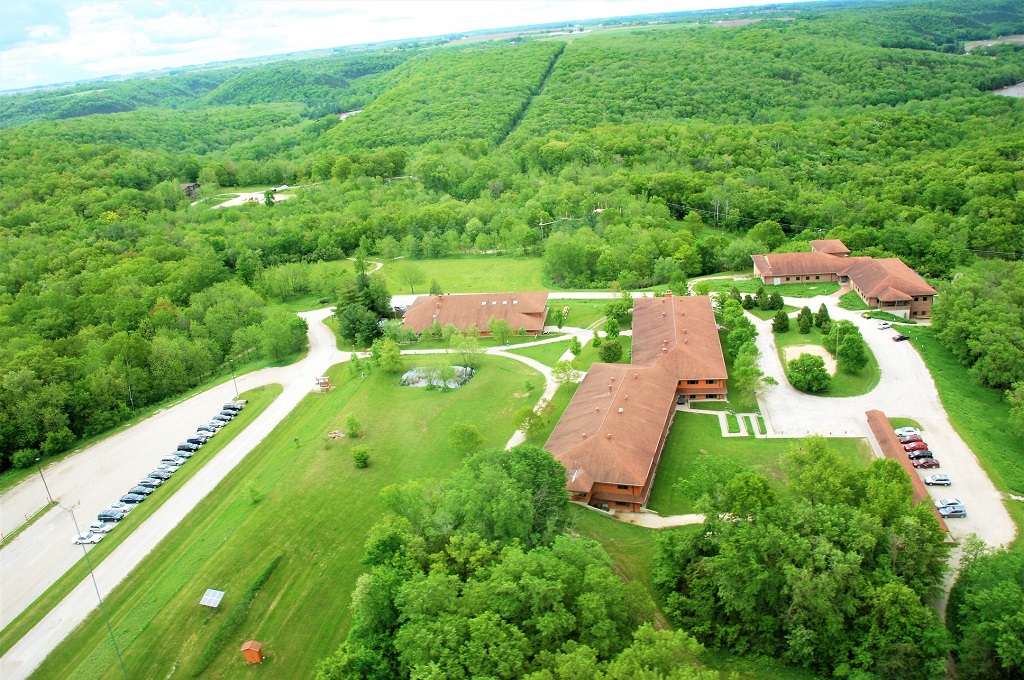
Children need to get back to nature…
Following his forestry studies at the University of Minnesota, Eagle Bluff founder Joe Deden spent time in Germany studying how students in that country learned about the environment and nature. He found that it was simple: they learned how to care about the environment by being in nature — taking classes by day and staying in youth hostels at night. And it hit him— he had to make this same opportunity available to students in his home state of Minnesota…
Joe returned to Minnesota in 1978 and within two years the nonprofit Root River Hardwood Forest Interpretive Center was created and, by 1982, adult education classes on land management were being offered in the basement of Joe’s home. In 1983 the organization changed its name to the Southeastern Minnesota Forest Resource Center to better reflect the mission at the time—to help landowners manage their forest land in a responsible, but profitable manner.

Shiitake Project
In the early ‘80s the Forest Resource Center received a grant from the Governor’s Council on Rural Development to study alternative agriculture crops. Thus began research into Shiitake mushroom cultivation and marketing. Shiitake is a delicacy mushroom native to Japan, grown on hardwood logs as a way for landowners to earn income.
In 1983, Eagle Bluff began researching cultivation of 52 different strains of Shiitake on more than 10,000 logs. We isolated the best strains and determined the most productive log species in which to grow them. This established Eagle Bluff as one of the leading researchers in the U.S. for Shiitake cultivation. We began year-round mushroom production in 1984 and continued until 1999. Today, we still produce Shiitake but they are now grown at nature’s pace and will fruit twice a year around Memorial and Labor Days.

Day-Use Center
In the early 1990s the organization took its first steps toward becoming a day-use nature center for students. A donation from Betty King of Winona, MN helped build the John Schroeder Renewable Resources Building, named for Betty’s grandfather. A two year grant from the Blandin Foundation was used to help complete the day-use center.
The John Schroeder Renewable Resource building opened in 1992 and our focus changed to educating students and away from Shiitake research. Staff were hired to develop curriculum and construction began on the first Tree Tops Ropes Course. The next step in the plan was to make it possible for students to stay several days just like the youth in Germany did. Funding was secured through the Blandin Foundation-Project EarthSense to begin construction of a dormitory and dining hall in December of 1996.

Eagle Bluff is Born
By 1997 staff were getting ready for residential groups. To better reflect our new mission, our name once again changed and we became Eagle Bluff Environmental Learning Center. That year our Professional Naturalist training program started and Eagle Bluff became accredited by the North Central Association of Colleges and Schools. Our 248-person dormitory opened in July and our first residential group was a Summer Science group from Albert Lea, MN. The dining hall opened in October and a second Tree Tops Ropes Course (West) was constructed.
Nineteen years after Joe Deden’s original vision, Eagle Bluff had become a full-fledged residential environmental learning center ready to begin the mission of educating students about the environment while in nature, just like his German inspiration.
In 2000, the Discovery Center Classroom building was completed and our residential campus became centralized. It also provided expanded learning opportunities, including:
- an indoor two-story climbing wall,
- indoor archery range
- auditorium for large group presentations
- a mews area that houses our live birds of prey
- 12 classrooms

Today
One of six residential environmental learning centers in the state of Minnesota, Eagle Bluff welcomes 16,000 visitors of all ages annually. Programming includes:
- The Outdoor School (K-12) provides more than 30 STEM based classes to 140 schools from Minnesota, Iowa, Wisconsin, and Illinois. Learning through inquiry and self-discovery, students are able to think like scientists while engaging directly with nature.
- Eagle Bluff offers 14 Summer Nature Camps for all ages and interests, focusing on outdoor experiences.
- The Environmental Education Fellowship hosts 14 fellows annually who are trained as naturalists and educators. During their tenure at Eagle Bluff, Fellows are able to take graduate credit through Hamline University and earn their certification as interpretive guides.
- Eagle Bluff offers several learning opportunities through our Adult Learning & Continuing Education program. Nature-based classes are offered as well as formal college credit programs.
In 2020, Eagle Bluff will trial a Nature Preschool with week-long summer day camps and, in collaboration with Fillmore County Head Start, offer nature based day-programming.
Thus, Eagle Bluff serves a population of students that range from preschool to K-12, and from college level to adult life-long learners, empowering them to care for the earth and each other.


